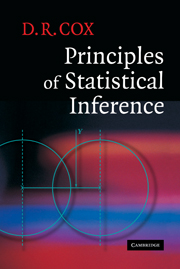Book contents
- Frontmatter
- Contents
- List of examples
- Preface
- 1 Preliminaries
- 2 Some concepts and simple applications
- 3 Significance tests
- 4 More complicated situations
- 5 Interpretations of uncertainty
- 6 Asymptotic theory
- 7 Further aspects of maximum likelihood
- 8 Additional objectives
- 9 Randomization-based analysis
- Appendix A A brief history
- Appendix B A personal view
- References
- Author index
- Subject index
Appendix A - A brief history
Published online by Cambridge University Press: 17 March 2011
- Frontmatter
- Contents
- List of examples
- Preface
- 1 Preliminaries
- 2 Some concepts and simple applications
- 3 Significance tests
- 4 More complicated situations
- 5 Interpretations of uncertainty
- 6 Asymptotic theory
- 7 Further aspects of maximum likelihood
- 8 Additional objectives
- 9 Randomization-based analysis
- Appendix A A brief history
- Appendix B A personal view
- References
- Author index
- Subject index
Summary
A very thorough account of the history of the more mathematical side of statistics up to the 1930's is given by Hald (1990, 1998, 2006). Stigler (1990) gives a broader perspective and Heyde and Seneta (2001) have edited a series of vignettes of prominent statisticians born before 1900.
Many of the great eighteenth and early nineteenth century mathematicians had some interest in statistics, often in connection with the analysis of astronomical data. Laplace (1749–1827) made extensive use of flat priors and what was then called the method of inverse probability, now usually called Bayesian methods. Gauss (1777–1855) used both this and essentially frequentist ideas, in particular in his development of least squares methods of estimation. Flat priors were strongly criticized by the Irish algebraist Boole (1815–1864) and by later Victorian mathematicians and these criticisms were repeated by Todhunter (1865) in his influential history of probability. Karl Pearson (1857–1936) began as, among other things, an expert in the theory of elasticity, and brought Todhunter's history of that theory to posthumous publication (Todhunter, 1886, 1893).
In one sense the modern era of statistics started with Pearson's (1900) development of the chi-squared goodness of fit test. He assessed this without comment by calculating and tabulating the tail area of the distribution. Pearson had some interest in Bayesian ideas but seems to have regarded prior distributions as essentially frequency distributions.
- Type
- Chapter
- Information
- Principles of Statistical Inference , pp. 194 - 196Publisher: Cambridge University PressPrint publication year: 2006



